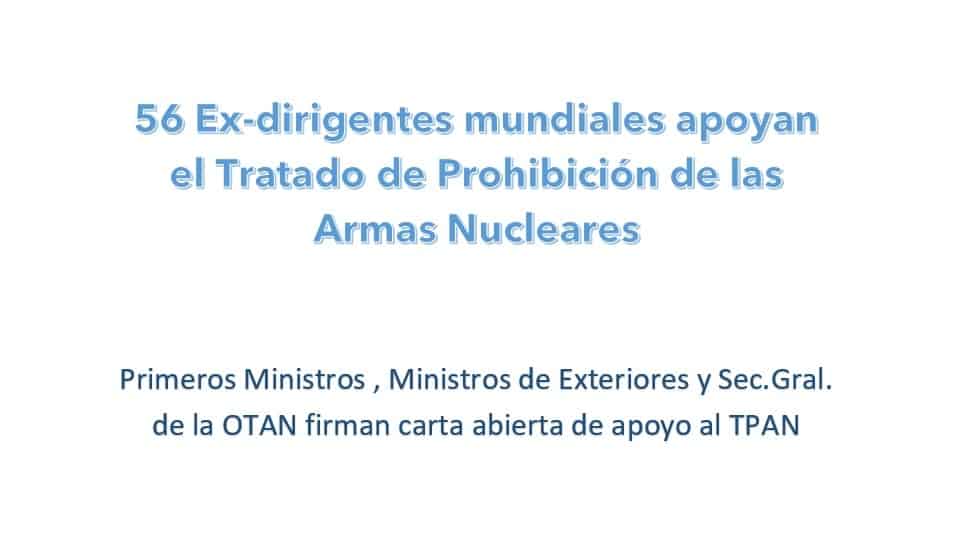21th September 2020
The coronavirus pandemic has clearly demonstrated that greater international cooperation is urgently needed to address all major threats to the health and well-being of humanity. Chief among them is the threat of nuclear war. Today, the risk of a nuclear weapon detonation - whether by accident, miscalculation or intentionally - appears to be increasing, with the recent deployment of new types of nuclear weapons, the abandonment of long-standing agreements on control weapons and the very real danger of cyberattacks on nuclear infrastructure. Let us heed the warnings made by scientists, doctors and other experts. We must not sleepwalking into a crisis of even greater proportions than the one we have experienced this year.
It is not difficult to foresee how belligerent rhetoric and bad judgment by the leaders of nuclear-armed nations could result in a calamity that would affect all nations and all peoples. As former presidents, former foreign ministers and former defense ministers of Albania, Belgium, Canada, Croatia, Czech Republic, Denmark, Germany, Greece, Hungary, Iceland, Italy, Japan, Latvia, Netherlands, Norway, Poland, Portugal, Slovakia, Slovenia, South Korea, Spain and Turkey - all of which claim to be protected by an ally's nuclear weapons - call on current leaders to push for disarmament before it is too late. An obvious starting point for the leaders of our own countries would be to declare without reservation that nuclear weapons have no legitimate purpose, be it military or strategic, in light of the
catastrophic human and environmental consequences of its use. In other words, our countries must reject any role that nuclear weapons are given in our defense.
By claiming that nuclear weapons protect us, we are promoting the dangerous and misguided belief that nuclear weapons enhance security. Instead of allowing progress toward a world free of nuclear weapons, we are preventing it and perpetuating nuclear dangers, all for fear of upsetting our allies who cling to these weapons of mass destruction. However, a friend can and should speak out when another friend engages in reckless behavior that endangers their life and the lives of others.
Clearly, a new nuclear arms race is underway and a race for disarmament is urgently needed. It is time to put a permanent end to the era of dependence on nuclear weapons. In 2017, 122 countries took a courageous and much-needed step in that direction by adopting the Treaty on the Prohibition of Nuclear Weapons, a landmark world treaty that places nuclear weapons on the same legal basis as
chemical and biological weapons, and establishes a framework for their verifiable and irreversible elimination. It will soon become binding international law.
To date, our countries have chosen not to join the world majority in supporting this treaty, but this is a position that our leaders must reconsider. We cannot afford to waver in the face of this existential threat to humanity. We must show courage and verve and join the treaty. As States parties, we could remain in alliances with nuclear-weapon States, as there is nothing in the treaty itself or in our respective defense pacts to prevent this. However, we would be legally obliged, never and under any circumstances, to assist or encourage our allies to use, threaten to use or possess nuclear weapons. Given the broad popular support in our countries for disarmament, this would be an indisputable and highly praised measure.
The prohibition treaty is an important reinforcement of the Non-Proliferation Treaty, which is now half a century old and which, although it has been remarkably successful in curbing the spread of nuclear weapons to more countries, has failed to establish a universal taboo against the possession of nuclear weapons. The five nuclear-armed nations that possessed nuclear weapons when the NPT was negotiated - the United States, Russia, Britain, France, and China - seem to see it as a license to retain their nuclear forces in perpetuity. Rather than disarm, they are investing heavily in upgrading their arsenals, with plans to retain them for many decades. This is obviously unacceptable.
The ban treaty adopted in 2017 can help end decades of disarmament paralysis. It is a beacon of hope in times of darkness. It allows countries to subscribe to the highest multilateral rule against nuclear weapons and to exert international pressure to act. As its preamble recognizes, the effects of nuclear weapons "transcend national borders, have serious repercussions for human survival, the environment, socio-economic development, the world economy, food security and the health of current and future generations. , and they have a disproportionate effect on women and girls, even as a result of ionizing radiation. '
With nearly 14.000 nuclear weapons located at dozens of sites around the world and on submarines patrolling the oceans at all times, the capacity for destruction is beyond our imagination. All responsible leaders must act now to ensure that the horrors of 1945 are never repeated again. Sooner or later, our luck will run out unless we act. He Treaty on the Prohibition of Nuclear Weapons lays the foundation for a safer world, free from this existential threat. We must embrace it now and work for others to join. There is no cure for a nuclear war. Our only option is to prevent it.
Lloyd Axworthy, former Minister of Foreign Affairs of Canada
Ban Ki-moon, former UN Secretary General and former South Korean Foreign Minister
Jean Jacques Blais, former Canadian Defense Minister
Kjell Magne Bondevik, former Prime Minister and former Minister of Foreign Affairs of Norway
Ylli bufi, former Prime Minister of Albania
Jean Chrétien, former Prime Minister of Canada
Willy claes, former Secretary General of NATO and former Minister of Foreign Affairs of Belgium
Erik derycke, former Minister of Foreign Affairs of Belgium
Joschka Fischer, former German Foreign Minister
Franco Frattini, former Minister of Foreign Affairs of Italy
Ingibjörg Solrún Gísladóttir, former Minister of Foreign Affairs of Iceland
Bjorn Tore Godal, former Minister of Foreign Affairs and former Minister of Defense of Norway
Bill Graham, former Minister of Foreign Affairs and former Minister of Defense of Canada
Hatoyama Yukio, former Prime Minister of Japan
Thorbjørn Jagland, former Prime Minister and former Minister of Foreign Affairs of Norway
Ljubica Jelušic, former Minister of Defense of Slovenia
Talavs Jundzis, former Minister of Foreign Defense of Latvia
Jan Kavan, former Minister of Foreign Affairs of the Czech Republic
Lodz Krapež, former Minister of Defense of Slovenia
Cirts Valdis Kristovskis, former Minister of Foreign Affairs and former Minister of Defense of Latvia
Aleksander Kwasniewski, former President of Poland
Yves leterme, former Prime Minister and former Minister of Foreign Affairs of Belgium
Enrico Letta, former Prime Minister of Italy
Eldbjørg Løwer, former Norwegian Defense Minister
mogens lykketoft, former Minister of Foreign Affairs of Denmark
John mccallum, former Canadian Defense Minister
John manley, former Minister of Foreign Affairs of Canada
Rexhep Meidani, former President of Albania
Zdravko Mršic, former Minister of Foreign Affairs of Croatia
Linda Murniece, former Minister of Defense of Latvia
Fatos Nano, former Prime Minister of Albania
Holger K. Nielsen, former Minister of Foreign Affairs of Denmark
Andrzej Olechowski, former Minister of Foreign Affairs of Poland
kjeld olesen, former Minister of Foreign Affairs and former Minister of Defense of Denmark
Anna Palace, former Minister of Foreign Affairs of Spain
Theodoros Pangalos, former Minister of Foreign Affairs of Greece
Jan Pronck, former (acting) Minister of Defense of the Netherlands
Vesna Pusić, former Croatian Foreign Minister
Dariusz rosati, former Minister of Foreign Affairs of Poland
Rudolf scharping, former German Defense Minister
juraj schenk, former Minister of Foreign Affairs of Slovakia
Nuno Severiano Teixeira, former Minister of Defense of Portugal
Jóhanna Sigurðardóttir, former Prime Minister of Iceland
Össur Skarphéðinsson, former Minister of Foreign Affairs of Iceland
Javier Solana, former Secretary General of NATO and former Minister of Foreign Affairs of Spain
Anne-Grete Strøm-Erichsen, former Norwegian Defense Minister
Hanna suchocka, former Prime Minister of Poland
szekeres imre, former Hungarian Defense Minister
Tanaka makiko, former Foreign Minister of Japan
Tanaka naoki, former Minister of Defense of Japan
Danilo Turk, former president of Slovenia
Hikmet Sami Turk, former Turkish Defense Minister
John N Turner, former Prime Minister of Canada
Guy Verhofstadt, former Prime Minister of Belgium
Knut Vollebaek, former Minister of Foreign Affairs of Norway
Carlos Westendorp and Head, former Minister of Foreign Affairs of Spain

